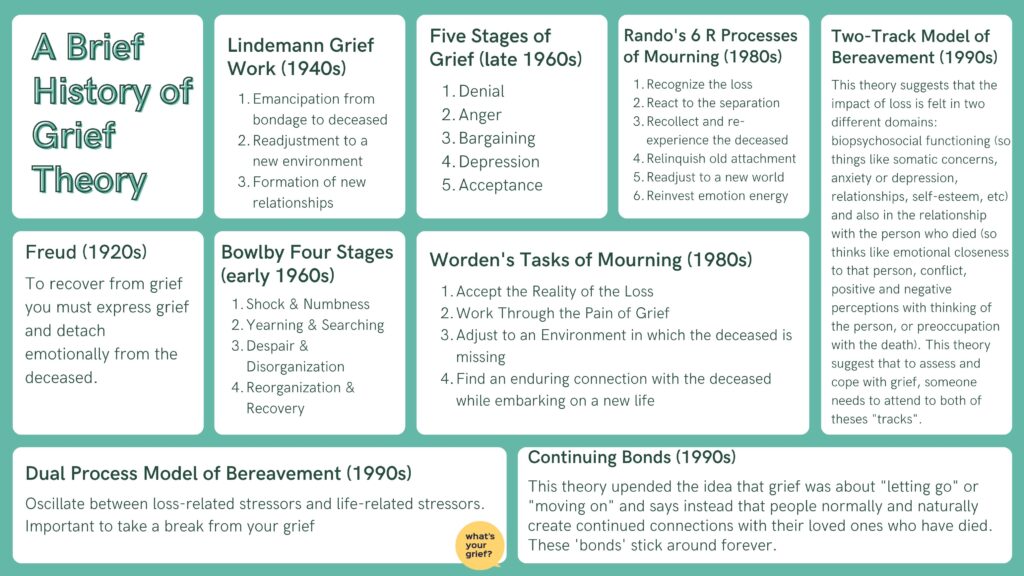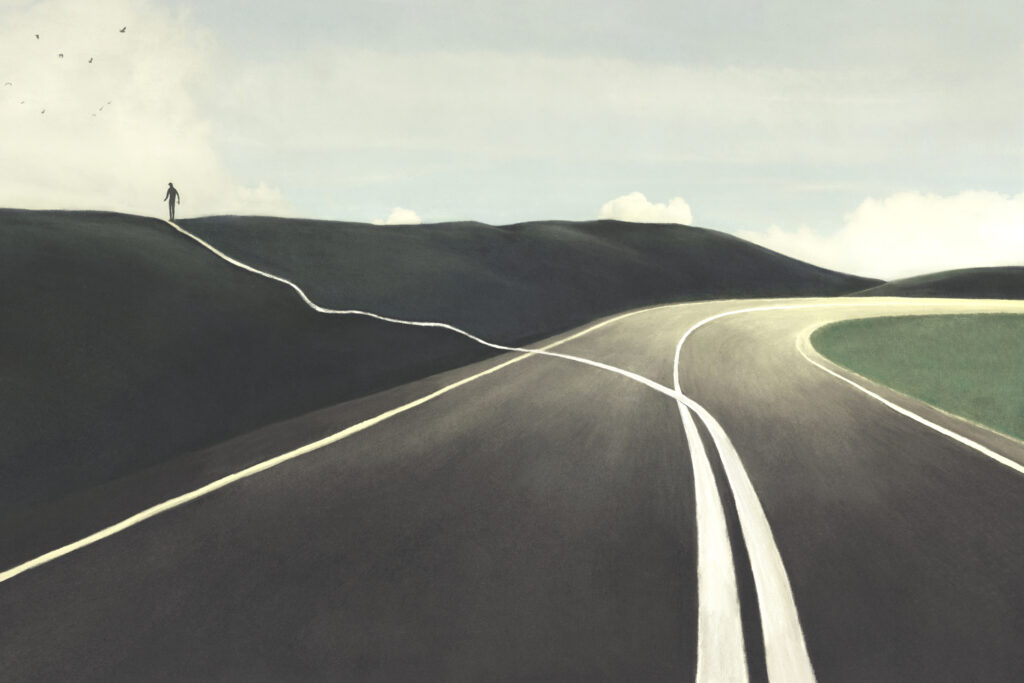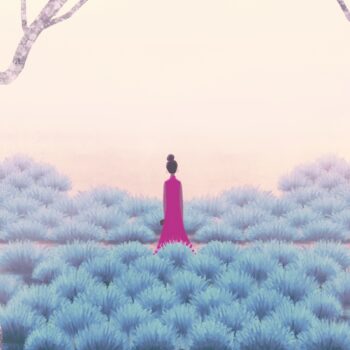What You Really Need to Know About 'Grieving Stages'
/ Understanding Grief : Eleanor Haley
What you really need to know about grieving stages is that, for the most part, they are a myth. It's easiest if we establish that from the get-go. To be specific, grief theories involving grief stages exist. But it is not true that individuals should expect to experience the uniform, categorical, or linear grief they describe.
Though there are common experiences that serve as the basis of grief theories that involve grieving stages, phases, etc., you may or may not relate to these things yourself. Patterns observed among grieving people are, in many ways, random and don't allow us to predict with any degree of certainty what anyone else will experience. There are too many factors involved.
You are grieving a specific loss, and you, yourself, are a very unique person. It's inconceivable that anyone could know exactly what you've been through or tell you exactly what will come next.
If there are no grieving stages, then why do so many people think they exist?
In the 20th century, people working in grief found these categorical approaches helpful in describing and discussing grief. As you can see in the chart below, "grief work" gave way to decades of models involving stages, processes, and tasks. This approach to grief theory prevailed until the 1990s when a few models were introduced that made more space for grief's unique nature, secondary losses and change, and the wide range of emotional and cognitive experiences considered "normal."

Now, I'm not trying to say that there's nothing helpful to glean from almost a century of grief theory. On the contrary, these theories are based on much thought, observation, and sometimes research. One can find plenty of truth and usefulness within them, especially if you understand their nuances.
However, grieving people need to know these models are not predictive or prescriptive. Instead, they are theoretical, and no single theory will likely ever be able to describe exactly what you will experience after loss. If you are grieving and interested in these theories, by all means, check them out. But we suggest doing so with the intent to keep what works and to take the rest with a grain of salt.
"Everyone can master a grief but he that has it". -- William Shakespeare
I'm not trying put down anyone's desire to understand, master, or lessen the pain of grief. As grieving people, I think the inclination to analyze and understand your experience makes sense.
Very few of us would opt to embark on such a frightening journey without a map if given the choice. Most of us would find reassurance in the possibility of predicting what could happen or knowing the right moves to make. For many individuals, this is why the idea of grieving stages feels so desirable. It's comforting to think such an overwhelming experience can be simplified or predictable.
As advocates for grief psycho-education, we're fully on board with learning more about grief. But unfortunately when it comes to grieving stages, the focus is often on unlearning the assumptions and expectations that stem from these types of theories.

The cost of misconceptions about grieving stages
Grief and loss professionals have been working to change ideas about grief being patterned, categorical, finite, or linear for decades. Helping individuals recognize that grief is incredibly unique depending on the person, their loss, and the context in which they live trumps any grief theory. But society is slow to adopt these ideas.
Understandably, people tend to only pay attention to misconceptions about grief once they are in the thick of it themselves. Grief is one of those things you can only fully "get" once you've experienced it. And it is only then that many realize their assumptions were wrong.
When someone realizes amidst their grief that their expectations do not match reality, they can come to two different conclusions. In the best-case scenario, they allow for the possibility that their assumptions about grief were wrong and accept their responses as a normal part of the experience. The worst-case scenario, which is the scenario that is most harmful, is that they come to believe they are somehow abnormal or dysfunctional because their grief doesn't follow an expected pattern.
Grieving stages in society and the need for a different way of thinking
It seems ironic how hard people work to cram grief into things like grieving stages, phases, tasks, etc, when you consider that grief ranks up there as one of the most complex experiences that almost every human will experience in their lifetime.
I liken grief to another complex and universal human experience--love. Both are things that most people will experience in their lifetime. Love and grief can both be simple yet also incredibly nuanced and layered. They are both experiences involving many emotions, thoughts, and experiences. And both can feel confusing and mysterious, even though they are intrinsically human, existing within and emanating from us.
Yet, despite their similarities, we as a society treat these experiences quite differently. Love is generally considered net positive, so we celebrate it and are happy to let it exist (as we should). Though I'll concede many have tried to describe, categorize, and master love, we're generally willing to accept its quirks and mysteries.
Grief, on the other hand, is considered a negative state. It involves pain, despair, unhappiness, depression, and (gasp!) sometimes a lack of "normal" and productive behavior. It feels terrible, so people treat it like something that should be controlled, corralled, cured, and eliminated.
But when you come to know grief, you start to see that it involves many unexpected thoughts and emotions. Though it may seem entirely negative at face value, it often involves more positive things like warm memories and connections as well.
That said, I will concede grief exists mostly on the painful end of the human-experience continuum, so it makes sense to want to find ways to help ease the pain. However, if we recognize that (1) it's not all bad, (2) significant loss stays with us forever, and (3) we're likely to experience new losses throughout our entire lifetime, doesn't it make sense that we should get better at allowing the experience of grief to ebb, flow, and exist?





Gloria R August 31, 2023 at 12:59 pm
Your article on our experiencing the death of a person many times before their actual death that others could see said what we, my husband and I, felt throughout our son’s life but couldn’t put into words.
You have captured what was happening in our life during the 18 yrs. after our dear son acquired a traumatic brain injury as a passenger in a car accident at the age of 17 1/2. His final and actual death came at age 35.
Jan J August 1, 2023 at 2:28 pm
After years of hearing people talk about their marriages (current or past), I’ve come to the conclusion that only a very small, lucky minority of people have or had happy marriages. I hear more complaints (from both women and men) than anything else – and I’m not talking about the minor complaints that result from living together. I think when a “well-meaning” friend tells you it’s time to move on, it is very revealing about them and the relationship(s) they have had. Yes, we all need to have interests and things to enjoy, but some losses can never be filled. Anyone who thinks a deep grief like that can be completely overcome or have “closure”, I wonder about the calibre of their relationships. An example – I’ve actually had one woman friend tell me “men are like busses, there’s always another one coming.” Then she revealed that she doesn’t love her husband of 20 years and in fact she has never been in love in her life. She asked me what it was, being in love. Poor gal.
Jackie July 31, 2023 at 2:28 pm
Revised: treasured memories & thoughts
Jackie July 31, 2023 at 2:26 pm
Sorry.. I won’t be writing long next time, it felt good to share my trother’s. memorys & thoughts w others. Thank u
Jackie July 31, 2023 at 2:20 pm
My loss is my best friend Val we grew up together since we were ages 7&8, she came from a very dysfunctional nonloving family her mom was always swearing & yelling calling her names, when I met Val she was a chubby freckled face little girl who was off by herself out on the playground. We started talking & hanging out from that day on, I took her under my wing & into my heart. She became part of my family, 4sisters & mom & dad, Val became daughter number 5. As kids we would take baths together giggling & writing letters on each other’s backs w soap, Val was at my house as much as her parents would allow, she went on vacations w us, we taught each other right from wrong. even though I was the older one, Val was the big sister, she was very strong willed, people always knew where they stood w her she didn’t hold back for the most part. She always helped me w my school work, I am an over thinker, & struggle w ADHD all my life. Val helped me w my weaknesses & insecurities, I was very shy & intimidated by so many things & people.
she was always very protective of me. I learned from my momma to be positive & always find the good out of things & people. Val & I were actually the opposite of each other, we seemed to always balance eachother out. We talked on the phone at least once a day somtimes for hrs. We both ended up in the Medical field nurses aides, we took care of each other thru medical surgerys,, Val was right there when I lost my mom in 98 from breast cancer, 8yrs later my dad. We were adults & had our own children at that time. She was aunt Val to my son, & I was aunt Jackie to her son & daughter. Even to this day her kids & granbabes call me aunt. She has 13granbabes & I have 4. I was there when each of her granbabes were born. I had a stroke in my rgt eye in 2011, couldn’t drive or work after that. I stayed w Val for a few months then I went & lived w my boyfriend till 2016. 2013 Val lost her dad ayr later lost 1 of her brother’s 2yrs later her baby brother died, Val & I spent a lot of time together thru her grieving. We always wanted each other’s opinion on decisions that we were making. I lost a breast from cancer in 2016, Val was there thru my surgery, 1month later my boyfriend passed away. Val & I were making plans too Celebrate our 50yrs of friendship in 2020 unfortunately we wernt able to do that.. Oct 2020 Val developed blood clots & was in hospital for a week, it was during covid so I couldn’t go see her. I found out on a Friday that we had to let her go, 3days later she was gone. Every day there is something that happens or comes up that is a Memory of her someway or somehow, it’s coming up on 3yrs, Its been one of the hardest things to learn too live my life wout her in it. Thank u for giving me the comfortbility to share,
Peggy July 30, 2023 at 7:36 pm
My husband passed away two weeks ago and everyday I wish that I could have just one more day with him because I feel that we did not have enough time together,he was only 66 years old and had cancer in the liver,inflamed lungs,sepsis in his bloodstream and could not stand up or walk anymore.I just feel that there had to be more they could do for him in the hospital to help him to get better,even though they said they have done everything they could do,is it normal for me to feel this way?
Mary August 16, 2023 at 1:04 pm
Absolutely! My husband of almost 50 years passed away suddenly at the end of February. You will always wonder if you could have done more. But, I am sure that everything was done. Questioning like that is a normal part of grieving. My heart has those feelings, but my head knows better. This is a long journey we are on. We will get there, but it will take quite a while!
Deacon Sean W July 29, 2023 at 5:02 pm
I’m commenting to neither agree or disagree relative to the stages of grief. As a widower, who has also lost a child, all 4 of my longtime best friends, and a brother in fairly rapid succession within the last 5.5 years; I have recognized, just as in my pastoral care to those who are grieving, there is no ‘cookie-cutter’ approach. I have written/published a book about my perspective taking care of my wife. I also wrote/published the sequel, about my own admission/submission to grief and its impact on me. The above are not my only foray into grief and as with all, I did not have any ‘assumptions’ of what to expect. I do know there is anticipatory grief. I do know there is bargaining. I do know there is anger. I do know there is depression/sadness. I also know there are ‘moments’ of grief, which arrive without warning; sometimes as in the passing of summer article, you know exactly what generated the tsunami wave; a favorite song, a special place; any shared memory which I may hold in any of my senses. Acceptance, not so much, instead I write a Thank You/Love letter to the person I lost for their place in my heart. I pray that I am helping others as I accompany them.
Jan July 28, 2023 at 8:22 pm
Many people are misinformed about Kubler-Ross’s “5 stages of grief.” She was talking about terminally ill people facing their own coming death. She was not talking about the grief we feel when losing a loved one – a huge difference. The terminally ill patient will be dead and will not be around to grieve, once they’re gone. The bereaved person will feel the loss of their loved one for the rest of their lives.
Susanne July 28, 2023 at 7:02 pm
Hello
Thank you for your post on understanding the stages of grief and loss or not.
I was reflecting while reading your post, that I, and I’m sure many others, that grief and loss has been in my life from such a young age. Adverse childhood experiences, unmet needs for connection/relationship in childhood the loss of being recognised and understood, the loss of having a hug and told how special you are, a lifetime of carry this sort of loss and grief has been painful and now in my later years a great gift in understanding the human condition. I have done many decades, on and off, of therapies that allowed what was not allowed to be expressed in my family. I have missed, this lifetime having a mum and dad who were present enough…and very grateful for the life given to me. I lost my dad 4 years ago, and was a peace within myself, grateful for the gifts of learning I had as a result of not only his painful past and what he grew through (WWII) and also that he did what he could. My mum is in care for dementia, she vaguely remembers me, her eldest daughter. However I ask about her life as a younger person, growing up in Malta and moving to Australia after the war. So much dislocation.
The suffering experienced over a lifetime has allowed me to appreciate the smaller things in life like waking up and knowing I have another day on the planet to be the best I can be for myself and my family and those I work with.
And also to appreciate what loss has to offer.
Brenda July 28, 2023 at 6:33 am
Reading the comments from ‘Lisa 2023’ was like reading something that I might have written myself.
Thank you Lisa. I think that reading these personal stories is all we need; for us and people who care to know that we are not really losing it!
No one can possibly know what grief actually means unless they’ve experienced it themselves. I know now that I never did after a working lifetime in the nursing profession. Even being exposed to grief as I was, it can never prepare you. No one can imagine the turmoil inside me now as I go through the sham of daily living without purpose.
I too am angered by all the theorising and categorising and medicalising of a very natural and individual process. For me grief still feels painful two years down the line, but then I think that is a normal reaction to a profound loss and there is no pill for that. Certainly I wasn’t in agreement with the immediate offer of anti-depressants from a GP!
To me the term ‘complicated grief’ is an unnecessary distraction of lists and numbers. Grief is by its nature is complicated; as complicated as we are. Naturally so.
So for me the best support is from those very special friends and family who allow me the space to navigate whatever hits me at any given moment; just being there and knowing instinctively when I need a hug or just need to be left alone, or to talk about my husband or ‘us’ when they know instinctively thats ok. Some of whom have experienced their own losses. The loss of ‘we’ and ‘us’ and ‘ours’ is one of the hardest things after almost 40 years. The rewiring of internalised routines, old daily habits that were always, ‘ours’. There are constant fleeting imaginings that our loved one is still there in a familiar sound or activity that turns my head in expectation. Flashbacks in time.
He was not just my loss, so many others miss him too, but reminding me of how fortunate I am to have the memories I have of loving and being loved, and building a life and having our many adventurous and sometimes tumultuous years together, just make me cry all the more to have them back. To say the things I should have said. An impossible dream I know. I also know that having him back, if that were ever possible, as ill as he was, would in reality not be in his interests. So I do find solace in that respect; that he died in his own familiar bed with my arms around him, freed from his struggle, and we had the mutual comfort of my nursing him at home myself to the end.
I am reminded that other people may live lesser lives than we did. But that in no way helps me to temper the loss which I can physically feel in my frequent unstoppable surges towards tears. I do not want to feel this way, and its not me dragging this out or wallowing in self pity. Its the sheer immensity of the loss and the dawning of realisation that we will never have the future that was mean’t for both of us; that is the worst thing of all. Not to see him ever again, or touch him, or talk or laugh with him, or share with him, or care for him, or be proud of him, or lean on him more than I ever realised I did. It’s profoundly heartbreaking.
Forever he will be the man I love. Comments that I ‘need to get a life’ make me angry. What bigger reminder of loss is there than being a lone woman amongst couples, and how could I ever replace my one and only with someone else’s company.
I can never get my life back and there will always be that huge space that is left behind. But if I’m stuck here I probably do need to get some interest. So I’ll do that if and when I can. I thank God there are special people in my world and the world that was his who I love and who love me. But still nothing replaces him.
Sending love to all those out there who grieve and all those who want to understand.
Karen August 1, 2023 at 3:05 am
Dear Brenda. Your post brought tears to my eyes as it was almost the same as the experience I had with my husband. He stayed within the love and comfort of our home until his passing and it’s a memory that lives with me.
I took councilling and the stages of grief were discussed, and for me they helped, the councillor stressed I wouldn’t necessarily follow the stages as written, and would occasionally regress, and she was right, but she taught me that I would learn to live alongside my grief and the stages should be markers only. With cognitive behavioural therapy too I’m learning to manage my life but I can’t help but still feel angry that our future was cut short.
Like you when people suggest I should now move on, it’s upsetting because my husband was, is and will always be the love of my life no-one can or will replace him and I’m comfortable with that and I think you have the same mindset.
I know one day people like us will find peace and contentment because we have experienced great love, at the moment the loss is so painful we may not see it.
What’s your grief has been such a help to me and I hope many others, I makes you understand you aren’t alone.
Best wishes to you for the future.